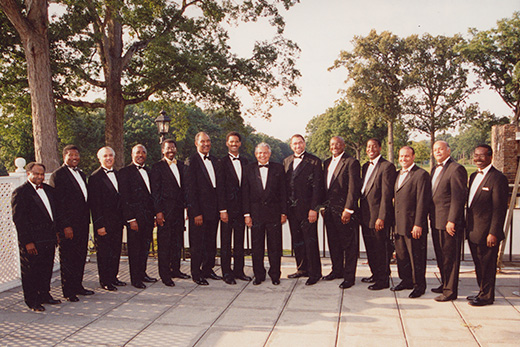In an era of deep-rooted segregation when black people were not allowed to join most predominantly white professional and cultural organizations emerged the Boulé, also known as the Sigma Pi Phi. Founded in 1904 in Philadelphia, Pennsylvania, by Henry McKee Minton and colleagues, the Boulé was America’s first black Greek-letter fraternity.
The 5,000-member fraternity with chapters set up in Chicago, Baltimore and other cities, has featured some of the most distinguished and influential black men in the nation, including W.E.B. DuBois and Martin Luther King Jr. These are black men who have been and are leaders in the struggle for civil rights, social justice, economic and educational equality.
Unlike undergraduate fraternal organizations, membership is limited to men who have already attained some degree of success within their chosen profession.
The prestigious professional fraternity was in its early years viewed as a secret organization until 1982 when it adopted a policy of limited and selected publicity, according to its website. Though it claims to be no longer “secret”, the fraternity still exists with “little fanfare” and one “that actively seeks to improve the lives of the citizens in the communities in which the members are associated through its social action and public policy programs and initiatives.”

Still, critics have viewed the organization as somewhat closed and have doubted their significant role. Conspiracy theorist and futurologist Steve Cokely, seen as the first to shine the light on the Boulé in the early to mid-90s, is reported to have described the fraternity as “powerful gatekeepers and foot soldiers for white supremacy.”
It is even documented that DuBois, the founding member of the New York City chapter of the Boulé once said, “The Boule was created to keep the black professional away from Marcus Garvey”.
Note that, around 1918 – the early stages of Boulé – Garvey’s “Back to Africa movement” through his newspaper “The Negro World”, was reaching over one million Diasporic Africans largely in North America without TV or radio.
DuBois intended to stop this, having been one of the strongest opponents of Garvey. Garvey is famed for being Jamaica’s first national hero who advocated for Black nationalism in Jamaica and particularly in the United States. He and DuBois had pushed for the advancement of civil rights but they would have differences that were mainly ideological and this would ruin any relationship the two influential black political leaders of the 1920s had.
Garvey, who grew up in an impoverished Jamaican community, believed that whites would never come to accept blacks and thus, he proposed that black Americans return to Africa, “where they would live as part of a majority population and perhaps have real political power,” an article on NPR noted.
DuBois, who was from a more privileged background, worked on improving the condition of African Americans, but he wanted to do this by working with liberal whites through his organization the NAACP which he founded some four years after Boulé.
In effect, DuBois “wanted to push shining examples of black citizenry front and center for white America to see, people so accomplished it would be hard to deny them their rightful place in society,” the NPR article said.
DuBois later felt that Garvey’s program of complete separation, which was a form of surrender to white supremacy, threatened the gains made by organizations such as the NAACP and Boulé. Hence, DuBois started an active campaign aimed at getting Garvey out, starting with Boulé.
Boulé, pronounced “boo lay”, in Ancient Greece “was a council of chiefs”. The fraternity is believed to have been fashioned after a secret society founded at Yale University called Skull & Bones. Members of Boulé are supposedly the “talented 10th” DuBois is noted for speaking of, hence, the organization sought to keep such select group of black professionals to itself.
DuBois stressed, according to Cokely: “The importance to steal the black professional away from Garvey because an Afrocentric organization that articulated and captured the black professional would give whitey no safe haven in the black community, so the Boule’ — the remaking of the house negro was necessary to build a group of negroes who had an investment in protecting the white system as produced by whitey having stolen this land…This is post reconstruction. Taking away the articulate negro, now desiring to replace them with organized institutions to keep them away from self-improvement.”
Thus, in the same period of the founding of the Boulé was the founding of what is called the 4 “black male” (Alpha Phi Alpha, Kappa Alpha Psi, Omega Psi Phi, and Phi Beta Sigma) and the 4 “black female” (Alpha Kappa Alpha, Delta Sigma Theta, Zeta Phi Beta, and Sigma Gamma Rho) college-based fraternities and sororities, according to the book Noble Drew Ali & The Moorish Science Temple of America: The Movement That Started It All. Then came the NAACP and National Urban League which were founded “in line with these movements.”
DuBois would later campaign against one of his worst critics, Garvey, including investigating controversies surrounding Garvey’s Black Star Line, the all-black steamship company. In the long run, Garvey was accused of running the company into liquidation, and he was quickly convicted.










